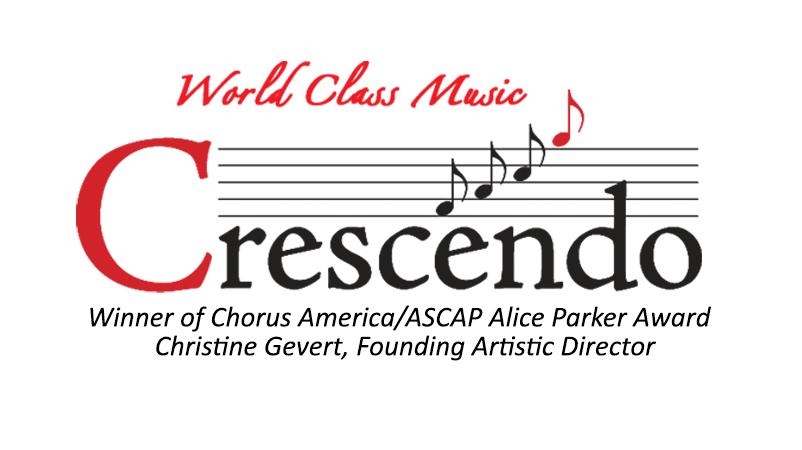Nature in Vivaldi’s Sounds
Concertos for Violin, Flute, and Two Mandolins
Recorded: October 6, 2024
Saint James Place,
Great Barrington, MA
Performers:
Period Instruments
Edson Scheid, solo violin, concertmaster
Rodrigo Tarraza, traverso
Jude Ziliak, Theresa Salomon, violin
Jessica Troy, viola
Serafim Smigelskiy, violoncello
Heather Miller Lardin, bass
Christine Gevert, harpsichord and direction
Andean Instruments
Carlos Boltes and Scott Hill, charango
Gonzalo Cortés and Rodrigo Tarraza, quenas
Program
Antonio Vivaldi (1678-1741)
Flute Concerto “La Notte” (The Night)
in G minor, RV 439, Op. 10/2
Largo / Fantasmi (Phantoms) – Presto / Largo / Presto / Il Sonno (Sleep) – Largo / Allegro
Violin Concerto ”La Tempesta di Mare” (The Storm at Sea)
in E flat major, RV 253, Op. 8/ 5
Presto / Largo / Presto
Flute Concerto “Il Gardellino”
in D major, RV 428 – Op.10/3
Allegro / Larghetto cantabile / Allegro
~ Intermission ~
Violin Concerto in D Major,
dedicated to Anna Maria, RV 229
Allegro / Andante / Allegro
Concerto for Two Mandolins
in G major, RV 532 (performed on Andean instruments)
Allegro / Largo / Allegro
The performance of this concerto is in memory of Jaime Soto León, Chilean composer and founder of Barroco Andino.
Learn More About All of the Performers
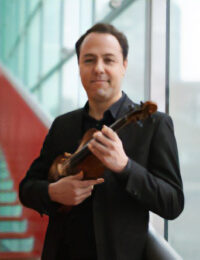 Edson Scheid has been praised for his “polished playing” (The Strad) and for being a “virtuoso violinist” (The Boston Globe). His performance of Strauss’s song Morgen at Carnegie Hall alongside Joyce DiDonato and Il Pomo d’Oro was described as follows: “The concertmaster, Edson Scheid, proved a worthy foil as violin soloist” (The New York Times).
Edson Scheid has been praised for his “polished playing” (The Strad) and for being a “virtuoso violinist” (The Boston Globe). His performance of Strauss’s song Morgen at Carnegie Hall alongside Joyce DiDonato and Il Pomo d’Oro was described as follows: “The concertmaster, Edson Scheid, proved a worthy foil as violin soloist” (The New York Times).
A native of Brazil, Edson Scheid is based in New York City, where he performs on both modern and period instruments with some of the city’s leading ensembles. He also frequently tours in Europe, Asia, North and South America with such ensembles as Les Arts Florissants and Il Pomo d’Oro.
As concertmaster, Edson has led performances with Seraphic Fire, Washington Bach Consort, Il Pomo d’Oro, Music Sacra New York, Juilliard415, The Clarion Orchestra, and Teatro Nuovo, in venues such as Carnegie Hall, Concertgebouw Amsterdam, Elbphilharmonie Hamburg, Sala São Paulo, Harris Hall in Chicago, Rose Theater at Jazz at Lincoln Center, and Alice Tully Hall at Lincoln Center.
Edson has been featured live in-studio on In Tune from BBC Radio 3, and his recording of Paganini’s 24 Caprices on the baroque violin for the Naxos label has been critically acclaimed: “Far from being mere virtuoso stunts, Scheid’s Caprices abound in the beauty and revolutionary spirit of these works” (Fanfare Magazine). His most recent solo album, “On Paganini’s Trail… H. W. Ernst and more”, has been released under the Centaur label. Early Music America praised Edson Scheid for taking “his time through these works, letting them breathe without losing sight of execution or musicality…”
Edson holds degrees from the Universität Mozarteum Salzburg, the Yale School of Music (recipient of the Broadus Erle Prize) and The Juilliard School (recipient of a Kovner Fellowship). He is a two-time winner of the Historical Performance Concerto Competition at Juilliard. www.edsonscheid.com
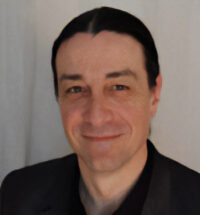 Rodrigo Tarraza started playing the quena (ancient flute of the Southamerican Andes) at the age of ten. As a young teenager he was mentored by the Chilean composer and conductor Jaime Soto León, and became an ensemble member of the Barroquito Andino (youth ensemble of the internationally renowned Barroco Andino). During those years he completed his formal music studies of modern flute at the Conservatorio Nacional de Chile. By the end of his studies he became very interested in the baroque flute after hearing a recording by Barthold Kuijken. He then studied baroque flute (or traverso) with Barthold Kuijken at the Royal Conservatory in The Hague, Netherlands. While also learning the Bansuri (early Indian flute).
Rodrigo Tarraza started playing the quena (ancient flute of the Southamerican Andes) at the age of ten. As a young teenager he was mentored by the Chilean composer and conductor Jaime Soto León, and became an ensemble member of the Barroquito Andino (youth ensemble of the internationally renowned Barroco Andino). During those years he completed his formal music studies of modern flute at the Conservatorio Nacional de Chile. By the end of his studies he became very interested in the baroque flute after hearing a recording by Barthold Kuijken. He then studied baroque flute (or traverso) with Barthold Kuijken at the Royal Conservatory in The Hague, Netherlands. While also learning the Bansuri (early Indian flute).
Rodrigo has toured widely as a soloist and chamber musician in Europe and both North and South America. He has also recorded and toured with La Petite Bande, Les Inégales (solo CD with suites by Jacques-Martin Hotteterre, Carpe Diem), and other prominent period-instrument groups. As a self-taught saxophone and EWI (Electronic Wind Controler) player, Rodrigo also has toured the world with Jazz-Fusion ensembles.
Rodrigo taught flute at the Escuela Moderna de Música y Danza (Santiago, Chile), and chamber music at the Catholic University of Santiago, Chile, and was a member of their professional Early Music Ensemble EstudioMusica Antigua. With this ensemble he toured and recorded Baroque solo flute repertoire, and Medieval music.
Currently he is a member of the Folgers Consort (Washington, DC) and performs frequently with the Crescendo Period Orchestra, and the Washington Bach Consort. He is also a member of the North Carolina Baroque Orchestra (NCBO).
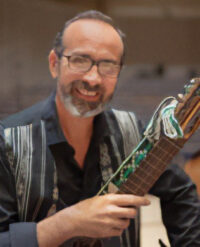 Carlos Boltes was born in Santiago de Chile, where started learning the charango from his brother Giovanni Vaccani. Later he joined the Chilean group Barroco Andino with which he made numerous tours of Chile and South America. He has a Bachelor’s degree from the Universidad Católica de Chile and a Master’s degree from Carnegie Mellon University in viola performance. His main teachers have been: Enrique López, Atar Arad and Larry Dutton (Emerson String Quartet). He was the principal violist of the Santiago Municipal Theater Chamber Orchestra, and the Virtuosi Chamber Orchestra of Connecticut, and has recorded for Naxos, Brioso and CBS Records. In 2000 he formed the Duo Alturas together with Canadian guitarist Scott Hill. They have premiered more than 50 works written for the Duo and other ensembles. Among them is the Elqui Trio where they join forces with the Flute player and expert in Andean wind instruments, Gonzalo Cortés. Mr. Boltes has been awarded an Individual Artist Scholarship from the Boston Fund and a Performance Scholarship from the Andes Foundation and also received the Connecticut “Latino de Oro” award in 2010. With the Duo Alturas he has won numerous awards: First Prize at the 2006 New England International Chamber Music Competition to the 2010 CMA / ASCAP Award for Innovative Music Programs. They recently won the Jury Award at the “World Folk Vision 2020” as the “Best Latin Band” and they were the winners among 3950 participants from 115 countries. Mr. Boltes has taught charango, viola and violin at the Community Division of the University of Hartford, Intake Academy Stamford, and at numerous festivals in Latin America. He has also taught numerous master classes in the United States, Central and South America, and Europe.
Carlos Boltes was born in Santiago de Chile, where started learning the charango from his brother Giovanni Vaccani. Later he joined the Chilean group Barroco Andino with which he made numerous tours of Chile and South America. He has a Bachelor’s degree from the Universidad Católica de Chile and a Master’s degree from Carnegie Mellon University in viola performance. His main teachers have been: Enrique López, Atar Arad and Larry Dutton (Emerson String Quartet). He was the principal violist of the Santiago Municipal Theater Chamber Orchestra, and the Virtuosi Chamber Orchestra of Connecticut, and has recorded for Naxos, Brioso and CBS Records. In 2000 he formed the Duo Alturas together with Canadian guitarist Scott Hill. They have premiered more than 50 works written for the Duo and other ensembles. Among them is the Elqui Trio where they join forces with the Flute player and expert in Andean wind instruments, Gonzalo Cortés. Mr. Boltes has been awarded an Individual Artist Scholarship from the Boston Fund and a Performance Scholarship from the Andes Foundation and also received the Connecticut “Latino de Oro” award in 2010. With the Duo Alturas he has won numerous awards: First Prize at the 2006 New England International Chamber Music Competition to the 2010 CMA / ASCAP Award for Innovative Music Programs. They recently won the Jury Award at the “World Folk Vision 2020” as the “Best Latin Band” and they were the winners among 3950 participants from 115 countries. Mr. Boltes has taught charango, viola and violin at the Community Division of the University of Hartford, Intake Academy Stamford, and at numerous festivals in Latin America. He has also taught numerous master classes in the United States, Central and South America, and Europe.
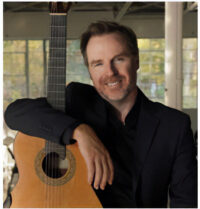 Scott Hill who according to the Washington Post plays with “…marvelous Virtuosity…” has performed with orchestras, choirs, instrumentalists, and vocalists throughout Canada, United States, Europe, Central and South America as a soloist and chamber musician at venues such as Carnegie Hall, Merkin Hall, Symphony Space, The Smithsonian, Le Maison de Mai in Paris, Le Petit Trianon theater and the Historic Asolo Theater. Scott has premiered more than seventy-five pieces of new music including works by Leo Brouwer, David MacBride, Javier Farias, Sergio Berchenko and Richard Harvey in addition to his own compositions. He has won the Chamber Music America/ASCAP Adventurous Programming Award, numerous commissioning grants, is a laureate winner of the World Folk Vision Awards, and is a Canada Arts Council recipient. He has collaborated with a wide range of instrumentalists and ensembles including; bandoneon player Daniel Binelli, Cuarteto Latinoamericano, Callisto Quartet, flutist Melanie Chirignan, the East Coast Contemporary Ballet, the Fairfax Symphony Orchestra, and the Voce Choir of Hartford. He has also been a Play USA, Carnegie Hall Lead Teaching Artist and is a Suzuki qualified guitar instructor. Scott earned an Honors Bachelor of Arts degree in music from Lakehead University and a Master of Music in guitar performance and a Graduate Professional Diploma in chamber performance from the Hartt School of Music.
Scott Hill who according to the Washington Post plays with “…marvelous Virtuosity…” has performed with orchestras, choirs, instrumentalists, and vocalists throughout Canada, United States, Europe, Central and South America as a soloist and chamber musician at venues such as Carnegie Hall, Merkin Hall, Symphony Space, The Smithsonian, Le Maison de Mai in Paris, Le Petit Trianon theater and the Historic Asolo Theater. Scott has premiered more than seventy-five pieces of new music including works by Leo Brouwer, David MacBride, Javier Farias, Sergio Berchenko and Richard Harvey in addition to his own compositions. He has won the Chamber Music America/ASCAP Adventurous Programming Award, numerous commissioning grants, is a laureate winner of the World Folk Vision Awards, and is a Canada Arts Council recipient. He has collaborated with a wide range of instrumentalists and ensembles including; bandoneon player Daniel Binelli, Cuarteto Latinoamericano, Callisto Quartet, flutist Melanie Chirignan, the East Coast Contemporary Ballet, the Fairfax Symphony Orchestra, and the Voce Choir of Hartford. He has also been a Play USA, Carnegie Hall Lead Teaching Artist and is a Suzuki qualified guitar instructor. Scott earned an Honors Bachelor of Arts degree in music from Lakehead University and a Master of Music in guitar performance and a Graduate Professional Diploma in chamber performance from the Hartt School of Music.
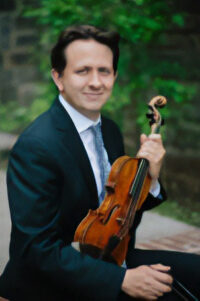 Jude Ziliak is known to audiences across North America as a charismatic and scholarly exponent of the baroque violin. First violinist of Sonnambula, frequent leader or soloist with American Bach Soloists, and a core member of Clarion and the Blue Hill Bach Festival, he has also appeared with Les Arts Florissants, The English Concert, and Philharmonia Baroque Orchestra, among others, and often appears in recital with noted collaborators including David Schulenberg, Nicola Canzano, and Elliot Figg. A dedicated teacher, Jude has served on the faculty of New York’s Special Music School since 2015 and directs the Clarion Collegium Week workshop each June. He studied baroque violin at Juilliard and modern violin at Rice and Boston University. When not performing or teaching music, he is a JD candidate at the Syracuse University College of Law.
Jude Ziliak is known to audiences across North America as a charismatic and scholarly exponent of the baroque violin. First violinist of Sonnambula, frequent leader or soloist with American Bach Soloists, and a core member of Clarion and the Blue Hill Bach Festival, he has also appeared with Les Arts Florissants, The English Concert, and Philharmonia Baroque Orchestra, among others, and often appears in recital with noted collaborators including David Schulenberg, Nicola Canzano, and Elliot Figg. A dedicated teacher, Jude has served on the faculty of New York’s Special Music School since 2015 and directs the Clarion Collegium Week workshop each June. He studied baroque violin at Juilliard and modern violin at Rice and Boston University. When not performing or teaching music, he is a JD candidate at the Syracuse University College of Law.
 Violinist Theresa Salomon has had her interpretations praised by The New York Times as “sizzling,” the Washington Post as “virtuosic,”and the Frankfurter Allgemeine as “on the highest level”. Playing baroque and modern violin, as well as viola, Theresa has a versatile musical career spanning many styles and configurations. She performs with many of the finest early music ensembles and festivals in North America. As an enthusiast of contemporary music she has premiered numerous works and appeared at festivals in Paris, Lisbon, Prague and Ostrava. Theresa is a member of the Orchestra of St Luke’s and has recorded music from Rosenmüller to Xenakis, as well as sound tracks to movies. She serves on the adjunct faculty of Montclair State University’s John J. Cali School of Music.
Violinist Theresa Salomon has had her interpretations praised by The New York Times as “sizzling,” the Washington Post as “virtuosic,”and the Frankfurter Allgemeine as “on the highest level”. Playing baroque and modern violin, as well as viola, Theresa has a versatile musical career spanning many styles and configurations. She performs with many of the finest early music ensembles and festivals in North America. As an enthusiast of contemporary music she has premiered numerous works and appeared at festivals in Paris, Lisbon, Prague and Ostrava. Theresa is a member of the Orchestra of St Luke’s and has recorded music from Rosenmüller to Xenakis, as well as sound tracks to movies. She serves on the adjunct faculty of Montclair State University’s John J. Cali School of Music.
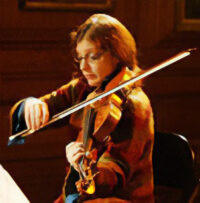 Jessica Troy wears many freelance hats. Ensembles she is a member of or performs regularly with include: Philharmonia Baroque, Trinity Wall Street, the Sebastians, the Orchestra of St. Luke’s, NYC Opera, Festival Orchestra of Lincoln Center (formerly Mostly Mozart). She can be heard on the Marlboro Festival’s 50th anniversary CD in György Kurtág’s Microludes, which she prepared with the composer. She has played in numerous Broadway pits (ranging from Porgy & Bess to Tootsie) and on many film scores (most recently Joker and Little Women). She has recorded quartet tracks for Lou Reed and Ani DiFranco, performed on TV with Renée Fleming and Whitney Houston, and on film with David Byrne.
Jessica Troy wears many freelance hats. Ensembles she is a member of or performs regularly with include: Philharmonia Baroque, Trinity Wall Street, the Sebastians, the Orchestra of St. Luke’s, NYC Opera, Festival Orchestra of Lincoln Center (formerly Mostly Mozart). She can be heard on the Marlboro Festival’s 50th anniversary CD in György Kurtág’s Microludes, which she prepared with the composer. She has played in numerous Broadway pits (ranging from Porgy & Bess to Tootsie) and on many film scores (most recently Joker and Little Women). She has recorded quartet tracks for Lou Reed and Ani DiFranco, performed on TV with Renée Fleming and Whitney Houston, and on film with David Byrne.
Praised
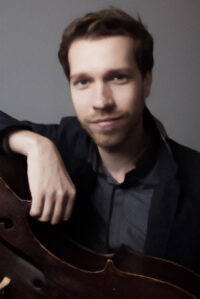 Praised for his versatility and soulful expressive style, Serafim Smigelskiy actively performs on both baroque and modern cellos. Serafim has toured four continents as a soloist and chamber musi Serafim Smigelskiy cian, appearing with Jupiter Chamber Players, TENET, Trinity Baroque, Sebastians, El Mundo, Frisson, NYBI and Argento among others.
Praised for his versatility and soulful expressive style, Serafim Smigelskiy actively performs on both baroque and modern cellos. Serafim has toured four continents as a soloist and chamber musi Serafim Smigelskiy cian, appearing with Jupiter Chamber Players, TENET, Trinity Baroque, Sebastians, El Mundo, Frisson, NYBI and Argento among others.
A passionate advocate of new music, Serafim has given numerous world premiere performances guided by composers such as Arvo Pärt, Chaya Czernowin, Georg Friedrich Haas, Mathias Pintscher, Magnus Lindberg, and many others. His love of early music and fascination with historical performance practice led him to study baroque cello with Phoebe Carrai at the Juilliard Historical Performance Department and to perform alongside Robert Mealy, Monica Huggett, William Christie and Nicholas McGegan. This season’s highlights include performances with Trinity Baroque, Helicon, TACO, Opera Lafayette, among other engagements.
Serafim also composes electronic music as Faremis Sound and produces audio books with his wife, Sierra Prasada, as HiSierrafim Audio.
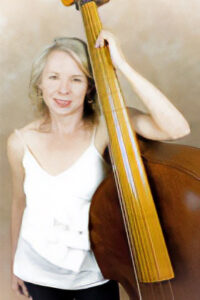 Heather Miller Lardin is principal bassist of the Handel + Haydn Society, directs the Temple University Early Music Ensemble, and co-directs the Philadelphia-based Classical period instrument ensemble Night Music. She performs regularly for the Staunton Music Festival, Bach Choir of Bethlehem, and Brandywine Baroque. Heather’s self-paced online Baroque Double Bass course is available on discoverdoublebass.com. She makes her home in her native Philadelphia suburbs, where she started playing double bass in 6th-grade orchestra.
Heather Miller Lardin is principal bassist of the Handel + Haydn Society, directs the Temple University Early Music Ensemble, and co-directs the Philadelphia-based Classical period instrument ensemble Night Music. She performs regularly for the Staunton Music Festival, Bach Choir of Bethlehem, and Brandywine Baroque. Heather’s self-paced online Baroque Double Bass course is available on discoverdoublebass.com. She makes her home in her native Philadelphia suburbs, where she started playing double bass in 6th-grade orchestra.
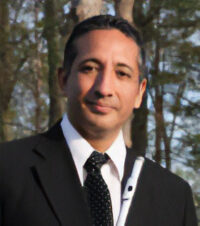 A native of Gonzalo CortésChile, was formerly principal flutist of the Classical Orchestra of Santiago, Chile. He studied flute at the Catholic University of Chile, and earned an Artist Diploma from Duquesne University. He has toured South America and the United States with ensembles such as the Simon Bolivar Orchestra, Orquesta Sinfonica of Chile, Classical Orchestra of Santiago, Hartford Symphony Orchestra, Farmington Valley Chorale, Chorus Angelicus & Gaudeamus, and Hartford Pops Band. Mr. Cortés is a proponent of World Music, specializing in flutes. In this capacity he recorded with the internationally acclaimed Chilean folk group Inti-Illimani. In 2006 he released his CD “Valle”, featuring a collection of original music composed and performed by him. Gonzalo teaches flute at Miss Porter’s School, and Trinity College in Connecticut. He is founder and Artistic Director of the Atacama Ensemble, Duo Del Sur, and member of the Elqui Trio.
A native of Gonzalo CortésChile, was formerly principal flutist of the Classical Orchestra of Santiago, Chile. He studied flute at the Catholic University of Chile, and earned an Artist Diploma from Duquesne University. He has toured South America and the United States with ensembles such as the Simon Bolivar Orchestra, Orquesta Sinfonica of Chile, Classical Orchestra of Santiago, Hartford Symphony Orchestra, Farmington Valley Chorale, Chorus Angelicus & Gaudeamus, and Hartford Pops Band. Mr. Cortés is a proponent of World Music, specializing in flutes. In this capacity he recorded with the internationally acclaimed Chilean folk group Inti-Illimani. In 2006 he released his CD “Valle”, featuring a collection of original music composed and performed by him. Gonzalo teaches flute at Miss Porter’s School, and Trinity College in Connecticut. He is founder and Artistic Director of the Atacama Ensemble, Duo Del Sur, and member of the Elqui Trio.
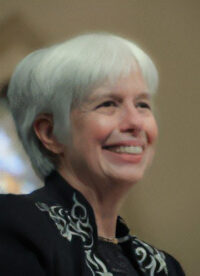 Christine Gevert, conductor, holds a master’s degree in organ and early music performance from the Hochschule für Musik und Theater, Hamburg, Germany. After earning a bachelor’s degree in music theory from the Conservatorio Nacional de Chile, she studied choral and orchestral conducting in Berlin and harpsichord in London. She has taught at the Berliner Kirchenmusikschule, the Universidad de Chile, and the Pontificia Universidad Católica in Santiago, Chile.
Christine Gevert, conductor, holds a master’s degree in organ and early music performance from the Hochschule für Musik und Theater, Hamburg, Germany. After earning a bachelor’s degree in music theory from the Conservatorio Nacional de Chile, she studied choral and orchestral conducting in Berlin and harpsichord in London. She has taught at the Berliner Kirchenmusikschule, the Universidad de Chile, and the Pontificia Universidad Católica in Santiago, Chile.
While conducting and performing in Europe and South America, she also recorded for Carpe Diem and Alerce. She has led master classes and workshops in early music, harpsichord, and baroque vocal technique at music festivals in Germany, Chile and the U.S., and has taught historic keyboards at the Berlin Church Music School in Germany, and locally at Bard College at Simon’s Rock. Ms. Gevert has appeared at the Washington Early Music Festival, the Berkshire Choral Festival, the Fringe concerts of the Boston Early Music Festival, and the Amherst Early Music Festival. In recent years she has given solo harpsichord recitals at the Early Music Festival in Narol, Poland, at the historic Auditorium Wanda Landowska near Paris, at the Metropolitan Museum of Art, and the Brooklyn Beat Festival. She performed at the International Festival of American Renaissance & Baroque Music at the Chiquitan Missions in Santa Cruz, Bolivia. She has authored and published more than eighty historical basso continuo realizations with the Swiss music publisher, Amadeus Verlag. The founder and artistic director of Crescendo and her own baroque ensemble Les Inégales, Christine is currently music director at Trinity Episcopal Church, Lime Rock, CT.
Crescendo and its programming
Crescendo is a national-award-winning music performance organization. For more than fourteen years, Crescendo has presented concerts year-round in northwestern Connecticut, the Berkshires, and the mid-Hudson Valley of New York. The organization is based at Trinity Church Lime Rock in Lakeville, CT.
Founder and Artistic Director, Christine Gevert, is celebrated for her innovative approach to programming and performance. Crescendo’s audiences are often rewarded with programs of rarely-heard and newly discovered works. Often Ms. Gevert uses original manuscripts to make her own performing editions for chorus, soloists and orchestra because there are no existing published editions. Frequently our programs feature early and contemporary music works alongside each other, creating a contrast for the listener. Eight new works have been commissioned for our chorus and vocal ensemble. Crescendo has presented ten U.S. premieres.
Crescendo’s innovative programming relies on a local base of dedicated and talented auditioned amateurs and professionals who make up the Crescendo Chorus and Crescendo Vocal Ensemble. Crescendo has its own Period Instrument Orchestra and Andean Ensemble, comprised of professionals from New York, Boston, Philadelphia, Washington DC and Hartford. These instrumentalists and the internationally recognized soloists who regularly collaborate with Crescendo bring the performances to a level comparable to the best ensembles in the country. Instrumental music ensembles and concerts with vocal soloists have been part of Crescendo’s programs since the beginning. Some of the performers have been: Julianne Baird (Philadelphia) soprano, Nicholas Tamagna (New York) countertenor, Peter Sykes (Boston) and Władysław Kłosiewicz (Warsaw, Poland), harpsichord, Chris Bellsucio (Boston), natural trumpet, Tricia van Oers, recorder, I Fagiolini Renaissance Vocal Ensemble (London, UK), L’Orchestre de Chambre Francaise (Paris, France), Peter Lekx (Montreal) baroque violin, Duo Alturas (Hartford) charango, viola and guitar, and Duo Les Inégales, traverso and harpsichord.
We are strongly committed to educational outreach―to our own singers, our audiences and local students. Talented local high school singers and young musicians are coached by Ms. Gevert as part of our “Young Baroque Artist Program”, and often play a part in our performances. She and members of the chorus visit local schools to work with students.
Artistic Director Christine Gevert is celebrated for her innovative approach to programming and performance: In 2014 Crescendo won the prestigious Chorus America / ASCAP Alice Parker Award. Today’s programming reflects some of the diversity and scope of music that Crescendo is known for.
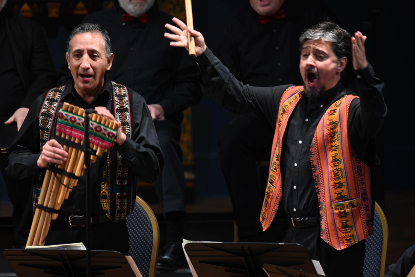
Musicians of Crescendo’s Latin American Ensemble
About the Performance
About the Composer, and the Andean Instruments
Antonio Lucio Vivaldi was an Italian Baroque composer, virtuoso violinist, teacher and cleric. Born in Venice, he was recognized as one of the greatest Baroque composers, and his influence during his lifetime was widespread across Europe. He is known mainly for composing many instrumental concertos, for the violin and a variety of other instruments, as well as sacred choral works and over forty operas. His best-known work is a series of violin concertos known as The Four Seasons. Many of his compositions were written for the female music ensemble of the Ospedale della Pietà, a home for abandoned children where Vivaldi (who had been ordained as a Catholic priest) was employed from 1703 to 1715 and from 1723 to 1740. Vivaldi also had some success with expensive stagings of his operas in Venice, Mantua and Vienna. After meeting the Emperor Charles VI, Vivaldi moved to Vienna, hoping for preferment. However, the Emperor died soon after Vivaldi’s arrival, and Vivaldi himself died less than a year later in poverty. After his death, Vivaldi’s music slid into obscurity until a vigorous revival in the 20th century. Today, he ranks among the most popular and widely recorded of Baroque composers, second perhaps only to Johann Sebastian Bach, who himself was deeply influenced by Vivaldi’s work. Wikipedia article: Antonio Vivaldi
The charango is a small Andean stringed instrument of the lute family, from the Quechua and Aymara populations in the territory of the Altiplano in post-Colonial times, after European stringed instruments were introduced by the Spanish during colonization. The instrument is widespread throughout the Andean regions of Bolivia, Peru, Ecuador, northern Chile and northwestern Argentina, where it is a popular musical instrument that exists in many variant forms.
About 26 inches long, the charango was traditionally made with the shell from the back of an armadillo, but it can also be made of wood, which some believe to be a better resonator. Wood is more commonly used in modern instruments. Many contemporary charangos are now made with different types of wood. It typically has ten strings in five courses of two strings each, but many other variations exist. Wikipedia article: Charango
“The Inca inherited many of their musical artifacts and practices from pre-Inca peoples, such as the Moche, Chimú, and Nazca. As was the case for Mesoamerica, in the Andean region instrumental music seems to have predominated, with large ensembles performing on flutes and panpipes, accompanied by drums, including the characteristic small, double-headed tinya of the Inca. The end-notched vertical flute known in Quechua as the quena was held sacred. Early examples had four finger holes, but many later flutes had five or six; some scholars have drawn conclusions about scale possibilities from the number and placement of finger holes.” BRITANNICA – “Latin American music” by Gerard Béhague
